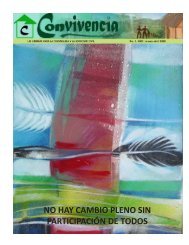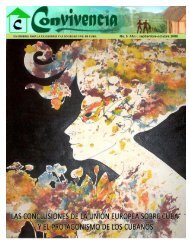SOMETHING NEW FOR CUBA:CIVIL SOCIETY’S PRIMACYEditorial 20. Mar-Apr-2011. <strong>Convivencia</strong> Magazine. www.convivenciacuba.esCuba experienced during the 20 th centurythree ways of organization as a nation:colonialism in which the primacy of anothernation deprives the colony of its sovereignty;capitalism in which market outweighs theState and the civil society; and this model ofsocialism in which the State imposes itself ina totalitarian way over market and over civilsociety. The injustices that these three sociopoliticaland economic ways cause are wellknown.Almost anybody would like to come back tothe past to copy it identically in our future.Neither one model nor the other such as wehave experienced them is right. This is so,among other reasons, because such modelsdon’t exist in almost in any place of thisworld anymore.Cuba is searching, following different paths,one way to structure its society. It’s anurgent need. Almost everybody believes thatthe state of things must change. But thequestion is: the change, where to?We believe that every healthy and lastingchange should combine: novelty,experiences and roots.The experiences lived cannot be invented ormodified, they are the recent past. They arethere. The anthropological roots cannot betorn out from the present or forgotten in theremote past. The national pantheon of theidentity is also there and it should be asource and a path for the new things. Thethings we should recreate, reinvent, conceiveand agree are the things that are novel forthe future. Then, what would be truly novel inthe Cuba of the 21 st century?A long way of reflection has led us to identify aconstituent element of the social body whichhas not been the main protagonist of the nationyet: the civil society.We don’t say that a flourishing and boomingcivil society did not exist in the last centuryuntil the year 1959 when it started to bethoroughly dismantled. On the contrary webelieve that the dense fabric of socialinteractions and the enterprising andindependent character of the civil societyduring the first five decades of the 20 th centurybuilt a republic with lights and shadows. Buteven with its injustices and inequalities, thatrepublic carried in its heart a plural, inclusiveand democratic seed, in spite of everything.The novelty and the concept of civil societyWe believe that “the novel thing” would be toachieve the rebuilding of the civil society withthe free and plural participation of all Cubansfrom the Island and from the Diaspora, first ofall, by reaching an agreement on theidentification and acknowledgement of whatthe term “novel”, which is relativelycontemporary, means to Cuba. Manyunderstand it this way:-It’s the open, complex, diverse, inclusive andinteractive collection of relations and resourcesthat constitute a social fabric or a civicframework of all those natural groups; social,cultural, sports, political, professional, welfare,supportive associations; of all those religious,Ediciones <strong>Convivencia</strong>Pinar del Río. 201281
fraternal, humanitarian institutions; of allthose organizations whether they are local,national or international.All of them should have as commoncharacteristics:1. They should be autonomous from anystructure of the State, in theirfoundation, in their procedures, intheir financing, in their organizationand actions; they should really benon-governmental.2. They should follow pacific andproactive methods and ends.3. They should be a free andparticipative public space. This publicspace also allows the groups of civilsociety to debate, to pressure,denounce or cooperate with the Stateand with the structures of the market,as well as to create states of opinionand pacific and democratic pressure.The debate of the civic and politicalmatters is also a part of the very civilsociety as if it were its atmosphere orhabitat. This civic fabric, that networkof initiatives, would give theFatherland the third leg or the thirdpillar back; the third column of thenational home which is the civilsociety and it would reach suchprominence and levels ofparticipation that it would assume theprimacy in the public administrationand in the progress and the holisticdevelopment of the nation, withoutthe exclusion of the Market or theState.The civil society: the new name fordemocracyThe way to interrelate the three legs ofthe stool of the nation will define thecharacter, the efficiency and thedurability of democracy in Cuba. Theinterdependence and mutual control ofthe three powers of the State, which is abasic and a foundational principle and anaccepted and acceptable patrimony ofthe modern States, should also beimplemented in the relations between theState, the Market and the Civil Society.The democracy with the absolute primacy ofthe market causes inequalities, injusticesand exclusions.The democracy of the Marxist-Leninistsocialism causes the same and itestablishes a dictatorship of one class overanother.The democracy with the primacy of civilsociety would be a way to organize thesociety as:-A school of empowerment, leadership,inclusion and self-management.-A fabric of solidarity and a subsidiaryprinciple.-A network of control and pressure over theMarket and the State.-It generates creativity, richness and acommunitarian patrimony, created anddistributed as fairly as possible.Civil Society: Catalyst of Governabilityand GovernanceWhat gives true consistency to a nation isnot only the capacity of its politicalgovernment, that is, its governability. It’salso and above all, the capacity of itscitizens to organize themselves in theframework of the civil society, and this isknown as governance.Some countries change their primeministers and cabinets with incrediblefrequency. These ministers and cabinetsundergo crisis and lack of credibility fromtheir parliaments; however, these arecountries which don’t lose their socialstability or their economic growth or theirinternational role and their governabilityturns itself sustainable because of theresponsible exercise of governance.The strongest the role of the civil society is,the more reduced and efficient theregulating role of the political power is, andthis political power should contribute thelegal framework and the guarantee of thesocial security in a subsidiary way.Differences between the power vacuum andthe civil society vacuum.Ediciones <strong>Convivencia</strong>Pinar del Río. 201282
- Page 2 and 3:
Consejo de Redacción de Convivenci
- Page 4 and 5:
Cuba does have thought, projects an
- Page 6 and 7:
with their changes and hesitations,
- Page 8 and 9:
well, eveyone knows that they are n
- Page 10 and 11:
There has to be a differentiation b
- Page 12:
lind. Infiltrations of bureaucracy
- Page 15 and 16:
We are, and we should be “the pro
- Page 17 and 18:
have been introduced during decades
- Page 19 and 20:
sacrifice his life, his prestige, h
- Page 21 and 22:
have different political options, i
- Page 23 and 24:
there is political will and changes
- Page 25 and 26:
Conclusions from its Council. We th
- Page 27 and 28:
TO FREE THE PRODUCTIVE FORCESAND TH
- Page 29 and 30:
tentative behaviors by the governme
- Page 31 and 32: the three powers of the State: the
- Page 33 and 34: what in our opinion is better for C
- Page 35 and 36: THERE IS NO FATHERLAND WITHOUTTHE S
- Page 37 and 38: Fatherland going to belong to every
- Page 39 and 40: CULTURE AND POLITICS IN CUBAEditori
- Page 41 and 42: that bearing in mind the strategies
- Page 43 and 44: POWER IS FOR SERVINGEditorial 10. J
- Page 45 and 46: An authentic exercise of power as a
- Page 47 and 48: “mosquitoes” which are the smal
- Page 49 and 50: “For I will take you from among t
- Page 51 and 52: forward by seizing the institutions
- Page 53 and 54: democratic participation where they
- Page 55 and 56: north and south of the human person
- Page 57 and 58: wins with the complementation and t
- Page 59 and 60: has reached a citizenship category
- Page 61 and 62: THE ABSOLUTE RESPECTFOR ALL OF THE
- Page 63 and 64: It is clear that it is about the in
- Page 65 and 66: negotiation techniques because it c
- Page 67 and 68: who are firmly coherent, which does
- Page 69 and 70: The government faced one first dile
- Page 71 and 72: credibility, the service and thesov
- Page 73 and 74: make them coherent with those inter
- Page 75 and 76: democracy even when all of thesecon
- Page 77 and 78: ECONOMY WITH FREEDOM AND RESPONSIBI
- Page 79 and 80: ethical dimension of the debate abo
- Page 81: expecting from us Cubans, men andwo
- Page 85 and 86: or social institution should keep i
- Page 87 and 88: State and the worst way to violate
- Page 89 and 90: diversity would not be considered a
- Page 91 and 92: democratic government whose capacit
- Page 93 and 94: is no possible development. Back in
- Page 95 and 96: dimension in order to safeguard the
- Page 97 and 98: .Requirements to publish announceme
- Page 99 and 100: That is why it is logical and good
- Page 101 and 102: or repressed for his faith and for
- Page 103 and 104: CIVIC FRIENDSHIP AND PACIFIC COEXIS
- Page 105 and 106: we have arrived to the conclusion t
- Page 107 and 108: Assembly in 1940:“! Parties, stay
- Page 109 and 110: WHAT COMES AFTER THE POPE’S VISIT
- Page 111 and 112: the search for it always implies an
- Page 113 and 114: In number 6 of our cited Editorial
- Page 115 and 116: CUBA DOES HAVE THOUGHT, PROJECTSAND
- Page 117 and 118: everlasting projects shall be never
- Page 119 and 120: prisoners of conscience. This group
- Page 121 and 122: After 110 years of the birth of tha
- Page 123 and 124: one ideology. To use persons to see
- Page 125 and 126: perspective given by any statesman
- Page 127 and 128: we respect everybody, we live weavi
- Page 129 and 130: Relación de artistas cubanos y las





